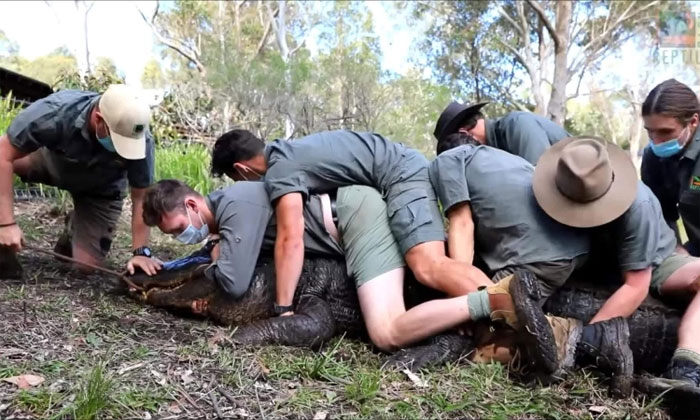The American alligator named Kanye was captured to be relocated after displaying excessive aggression towards its peers and staff at the Australian Reptile Park in New South Wales.
This breeding season, Kanye exhibited aggressive behavior towards 54 other alligators in the park, even attacking staff members. As a result, it was separated to live alone until it calmed down. A video of the capture process was shared on social media on October 21, garnering over 47,000 views to date.
In the video, staff members used ropes to secure Kanye’s snout and pulled it out of the water. They then restrained the animal, tied its snout, and prepared it for transport to a new location.
Tim Faulkner, the director of the Australian Reptile Park, explained that Kanye was causing significant stress to the other alligators. “Kanye is a young male, full of testosterone, and is causing a lot of trouble. Therefore, the best thing we can do right now is to take him to a separate place where he can have some quiet space,” he said.
“American alligators possess one of the strongest jaws in the animal kingdom, and a single bite can be life-threatening. Therefore, our excellent staff must be extremely cautious during the capture process,” Faulkner added.

Kanye the alligator is approximately 4 meters long and weighs nearly 400 kg.
Measuring about 4 meters in length and weighing nearly 400 kg, relocating Kanye was no easy task. It took more than 12 people to locate and capture him from the pond. The staff plans to keep him in his new home for about a month before releasing him back with his peers once the peak breeding season ends and hormone levels decrease.
“Our pond is usually very calm, with not much major conflict occurring. We even saw this at the beginning of the year when we introduced 20 males into the pond,” Faulkner noted. However, Kanye’s condition posed a threat to himself, other alligators, and the staff.
Currently, it is spring in Australia, and alligators are entering their breeding season. In the United States, this period begins in April, and alligators also become more aggressive. The warm spring weather means alligators are more active, according to the Florida Fish and Wildlife Conservation Commission (FWC). Rising temperatures lead to increased metabolism, prompting them to search for prey such as fish, snakes, turtles, small mammals, and birds. The FWC advises the public not to feed alligators, to supervise pets carefully, and to maintain a safe distance from large bodies of water.


















































